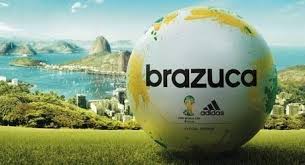By Mark Baber
May 23 – Notwithstanding a recent Greenpeace report which found toxic chemicals in 33 sportswear products produced by Adidas, Nike and Puma, Adidas has briefed journalists in Munich that the World Cup will play a “an important role” in adding “€1-1.2 billion (£829 -948 million) to operational revenue.”
Adidas provides the official match ball (which Greenpeace found contains environmentally toxic Nonylphenol ethoxylates) and is kitting out World Cup finalists including Spain, Argentina, Colombia, Germany, Japan, Mexico, Nigeria and Russia. The new Adidas forecast amounts to an 8% sales growth for 2014.
Adidas, which is in second place in the global sportswear market, has been losing market share in Western Europe to their Nike who are official kit provider for Australia, Brazil, Croatia, England, France, Greece, Netherlands, Portugal, South Korea and United States.
Puma, who supply World Cup sides including Italy, Switzerland, Uruguay, Chile, Algeria, Cameroon, Ivory Coast and Ghana, have made a solid commitment to the Greenpeace campaign as a “Detox Leader” but have, according to the recent tests, yet to fully rid their supply chain of toxic chemicals which can damage the environment, human and animal health.
Greenpeace have accused Adidas of “greenwashing” the dangers to the environment from its manufacturing processes, whilst chief executive Herbert Hainer concentrated in his briefing on the importance of the commercial battle against Nike saying, “Football is the DNA of our company. We want to clearly show that we are number one in football.”
Adidas will be investing a “double-digit million sum” in World Cup advertising, with much of that based on social media campaigns focusing on news from its sponsored teams and players such as Messi and Ozil.
Adidas and Nike between them share 80% for many soccer products, and the World Cup is crucial both for sales and marketing. However, the World Cup will also be an opportunity for Greenpeace to highlight and its anti-toxicity campaigns, especially against PFCs, and mobilise consumer pressure for a safer environment.
Contact the writer of this story at moc.l1734969893labto1734969893ofdlr1734969893owedi1734969893sni@r1734969893ebab.1734969893kram1734969893

